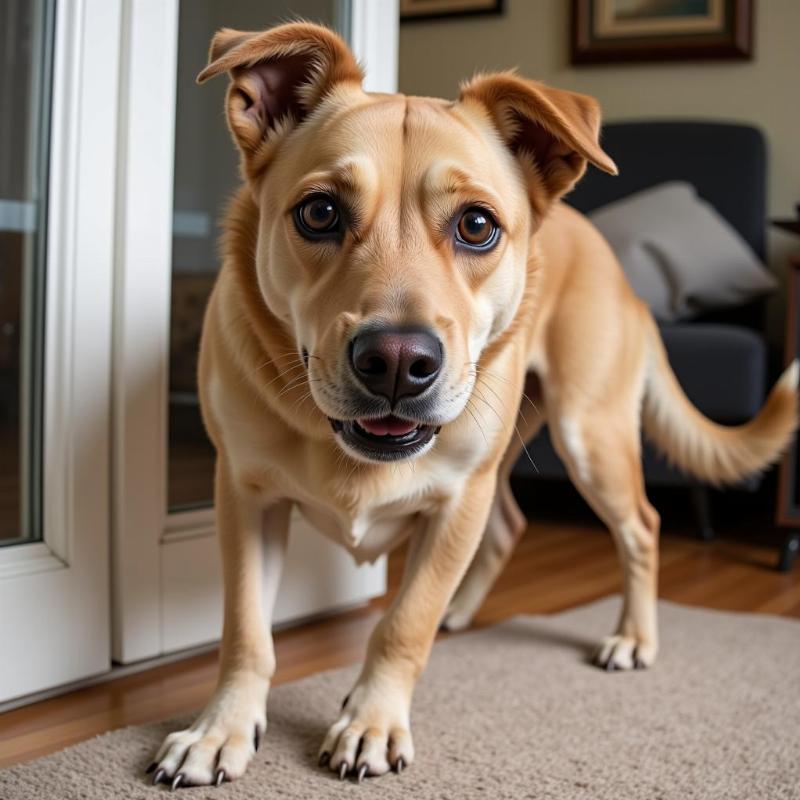Separation anxiety in dogs can be a heartbreaking challenge for both pet and owner. It manifests in destructive behaviors, excessive barking, and even self-harm when left alone. Many owners wonder if dog daycare can be a solution. While daycare can offer benefits, it’s crucial to understand that it’s not a cure-all for separation anxiety and can sometimes even exacerbate the issue. Let’s explore the complexities of this approach and discuss how to best support your anxious companion.
Understanding the Nuances of Canine Separation Anxiety
Before considering daycare, it’s essential to accurately diagnose your dog’s anxiety. Is it truly separation anxiety, or is your dog simply bored or under-stimulated? True separation anxiety stems from a deep-seated fear of being alone, whereas boredom might lead to destructive behaviors but without the same level of distress. Consulting with a veterinarian or a certified professional dog trainer in the US is crucial for accurate diagnosis and developing a tailored behavior modification plan. They can help differentiate between separation anxiety and other behavioral issues and guide you towards the most effective strategies.
 Dog showing signs of separation anxiety
Dog showing signs of separation anxiety
Dog Daycare: A Band-Aid or a Beneficial Tool?
Dog daycare can provide socialization, mental stimulation, and physical exercise, which are all vital for a dog’s overall well-being. For dogs experiencing boredom or mild anxiety related to lack of activity, daycare can be a fantastic outlet. However, for dogs with true separation anxiety, daycare can sometimes mask the problem rather than address the root cause. The constant presence of other dogs and people might distract your dog from their anxiety while at daycare, but the underlying fear remains. When they return home and are alone again, the anxiety can resurface, potentially even stronger than before.
The Importance of a Holistic Approach
If your dog suffers from separation anxiety, the most effective approach involves a combination of strategies tailored to their specific needs. Behavior modification techniques, such as desensitization and counter-conditioning, are often recommended under the guidance of a certified professional dog trainer. These techniques gradually acclimate your dog to being alone by starting with short absences and gradually increasing the duration. Creating a safe and comfortable space for your dog, such as a crate or a designated “safe zone,” can also help alleviate their anxiety.
Integrating Daycare Strategically
While daycare isn’t a cure, it can be a helpful component of a comprehensive treatment plan for separation anxiety. The key is to use it strategically and in conjunction with other behavior modification techniques. For example, short daycare sessions can provide a break for both you and your dog during the training process, preventing burnout and frustration. However, it’s crucial to continue working on desensitization and counter-conditioning exercises at home to address the underlying anxiety.
Conclusion: Finding the Right Balance for Your Anxious Dog
Does dog daycare help with separation anxiety? The answer is complex. While it can offer benefits like socialization and exercise, it’s not a standalone solution and can sometimes even be counterproductive. The most effective approach involves a comprehensive plan that includes professional guidance, behavior modification, and potentially strategic use of daycare as a supplementary tool. By addressing the root cause of your dog’s anxiety and providing them with the right support, you can help them overcome their fear of being alone and live a happier, more relaxed life.
FAQ
-
How can I tell if my dog has separation anxiety? Common signs include destructive behavior, excessive barking or howling, pacing, self-harm (like licking or chewing paws), and inappropriate elimination when left alone.
-
Is dog daycare a bad idea for dogs with separation anxiety? It’s not inherently bad, but it’s not a cure. It can be helpful as part of a broader treatment plan but shouldn’t be the sole solution.
-
What are some effective treatments for separation anxiety? Desensitization and counter-conditioning, crate training, creating a safe space, and medication (in some cases) can be effective.
-
How can I find a qualified dog trainer to help with separation anxiety? Look for certified professional dog trainers with experience in treating separation anxiety. The Certification Council for Professional Dog Trainers (CCPDT) is a good resource.
-
How long does it take to treat separation anxiety in dogs? It varies depending on the severity of the anxiety and the dog’s individual response to treatment, but it can take weeks or even months.
-
Can medication help with separation anxiety in dogs? In some cases, medication can be prescribed by a veterinarian to help manage the dog’s anxiety in conjunction with behavior modification.
-
What should I do if my dog’s separation anxiety is severe? Consult with a veterinarian or a veterinary behaviorist for a comprehensive assessment and treatment plan.
Related Articles
- all good dogs daycare lawrenceville
- is it cruel to crate a dog while at work
- dog boarding traverse city mi
- male dog aggressive when female in heat
Beautdogs.us: Your Trusted Source for Dog Care Expertise
Beautdogs.us is a leading dog lifestyle website in the US, dedicated to providing comprehensive and reliable information on dog care, breeds, and products. Whether you’re a new dog owner or a seasoned expert, Beautdogs.us offers expert advice on everything from training and nutrition to health and wellness. We are passionate about helping you build a strong and loving bond with your canine companion. For any inquiries, contact us at [email protected] or call us at +1 501-555-7529.